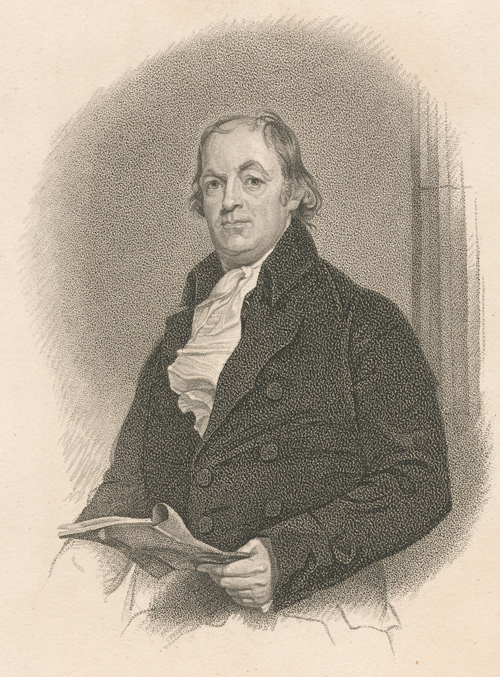In Washington City, the Federalist Senator from Pennsylvania, James Ross, gives an impassioned speech suggesting a military invasion to re-open the port of New Orleans to American commercial shipping. His Mississippi Question will need an answer before President Jefferson‘s Western Expedition can begin.
James Ross (1762–1847)
Courtesy the Miriam and Ira D. Wallach Division of Art, Prints and Photographs: Print Collection, The New York Public Library. “James Ross Esq.” New York Public Library Digital Collections. Accessed June 3, 2023. digitalcollections.nypl.org/items/510d47db-199a-a3d9-e040-e00a18064a99.
Engraving Text: “From the original picture painted by T. Sully in possession of the Pennsa. Academy of the Fine Arts[.] Engraved by Goodman and Piggot for the Port Folio Pub. by H. Hall.”
The Mississippi Question
Mr. Ross rose and said . . . .
From the very position of our country, from its geographical shape, from motives of complete independence, the command of the navigation of the river ought to be in our hands. We are wantonly provoked to take it.
I have heard it suggested that another mode has been contemplated for getting rid of this crisis in our affairs. If we remain perfectly quiet and passive, show no symptoms of uneasiness or discontent; if we give no offence to the new and probable masters of the Mississippi; may be they will sell! To me it is utterly incredible that such an effect would flow from such a conduct.
. . . I have seen it stated in the newspapers that those who now pretend to claim that country may be persuaded to sell, by giving two million of dollars to certain influential persons about the Court—
Here Mr. Wright, of Maryland, called Mr. Ross to order, and said that he thought it improper to debate upon confidential information which, in his opinion, should be kept secret.[1]Annals of Congress of the United States, 7th Congress, 2nd Session (Washington: Gales and Seaton, 1851) 12:86,88 retrieved from … Continue reading
Refusing to speak in executive session, Senator Ross continued his speech with an open gallery on 16 February 1803.
James Ross represented Pennsylvania in the U.S. Senate between 1794 and 1803. At an 1817 reception for President James Monroe in Pittsburgh, Monroe said of Ross:
The gentleman to whom this country owes a great debt of gratitude for the purchase of Louisiana is now president of this meeting. We always differed in politics. He is a Federalist. I am a Democrat. It was he who first called to the attention of President Jefferson the necessity of demanding the free navigation of the Mississippi river. It was Senator Ross who made Pittsburgh the’ Gateway of the West.’[2]James I. Brownson, The Life and Times of Senator James Ross (Washington County Historical Society, 1910) page 27, retrieved from www.electricscotland.com/HISTORY/america/james_ross.pdf accessed on 2 … Continue reading
Notes
| ↑1 | Annals of Congress of the United States, 7th Congress, 2nd Session (Washington: Gales and Seaton, 1851) 12:86,88 retrieved from https://memory.loc.gov/cgi-bin/ampage?collId=llac&fileName=012/llac012.db&recNum=39. |
|---|---|
| ↑2 | James I. Brownson, The Life and Times of Senator James Ross (Washington County Historical Society, 1910) page 27, retrieved from www.electricscotland.com/HISTORY/america/james_ross.pdf accessed on 2 May 2022. |
Experience the Lewis and Clark Trail
The Lewis and Clark Trail Experience—our sister site at lewisandclark.travel—connects the world to people and places on the Lewis and Clark Trail.
Discover More
- The Lewis and Clark Expedition: Day by Day by Gary E. Moulton (University of Nebraska Press, 2018). The story in prose, 14 May 1804–23 September 1806.
- The Lewis and Clark Journals: An American Epic of Discovery (abridged) by Gary E. Moulton (University of Nebraska Press, 2003). Selected journal excerpts, 14 May 1804–23 September 1806.
- The Lewis and Clark Journals. by Gary E. Moulton (University of Nebraska Press, 1983–2001). The complete story in 13 volumes.


